Principles of Care: Importance, Vulnerable People, and Legislation
VerifiedAdded on 2023/06/04
|12
|3985
|382
Report
AI Summary
This report delves into the principles of care, emphasizing their significance in healthcare settings. It examines how these principles, encompassing safety, dignity, independence, privacy, and effective communication, are crucial for providing respectful and equitable patient care. The report highlights the positive impact of these principles on the rights of vulnerable individuals, underscoring the importance of person-centered care and the protection afforded by legislation such as the Care Act 2014. It also addresses the challenges within healthcare organizations that can hinder the delivery of quality care, such as funding issues, technological limitations, and communication gaps. Furthermore, the report analyzes how legislation plays a vital role in safeguarding vulnerable populations and promoting their well-being through empowerment, protection, prevention, partnership, and accountability principles. It underscores the importance of healthcare communities in providing equal opportunities, effective access to healthcare, and support services for vulnerable individuals, ensuring their rights and safety.
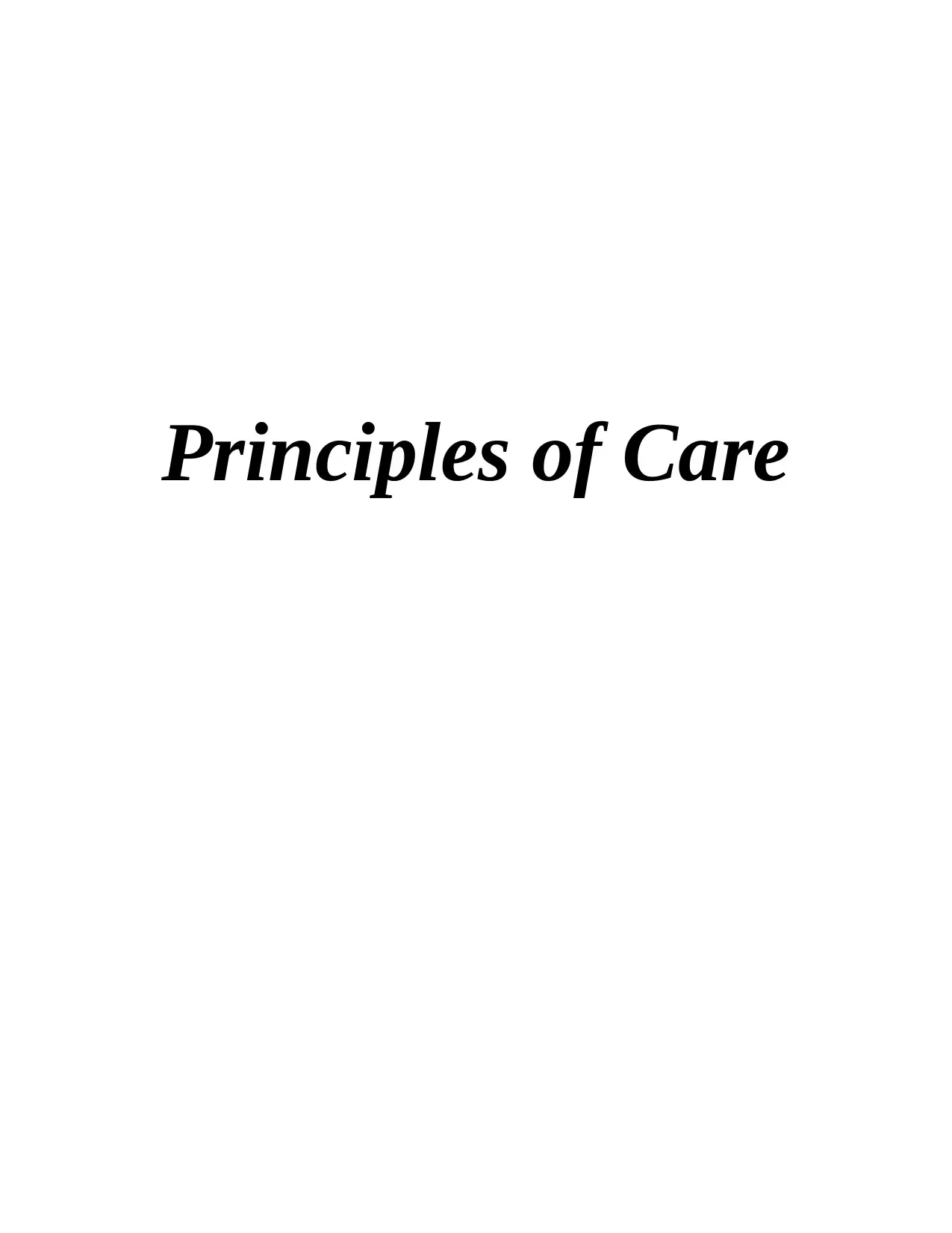
Principles of Care
Paraphrase This Document
Need a fresh take? Get an instant paraphrase of this document with our AI Paraphraser
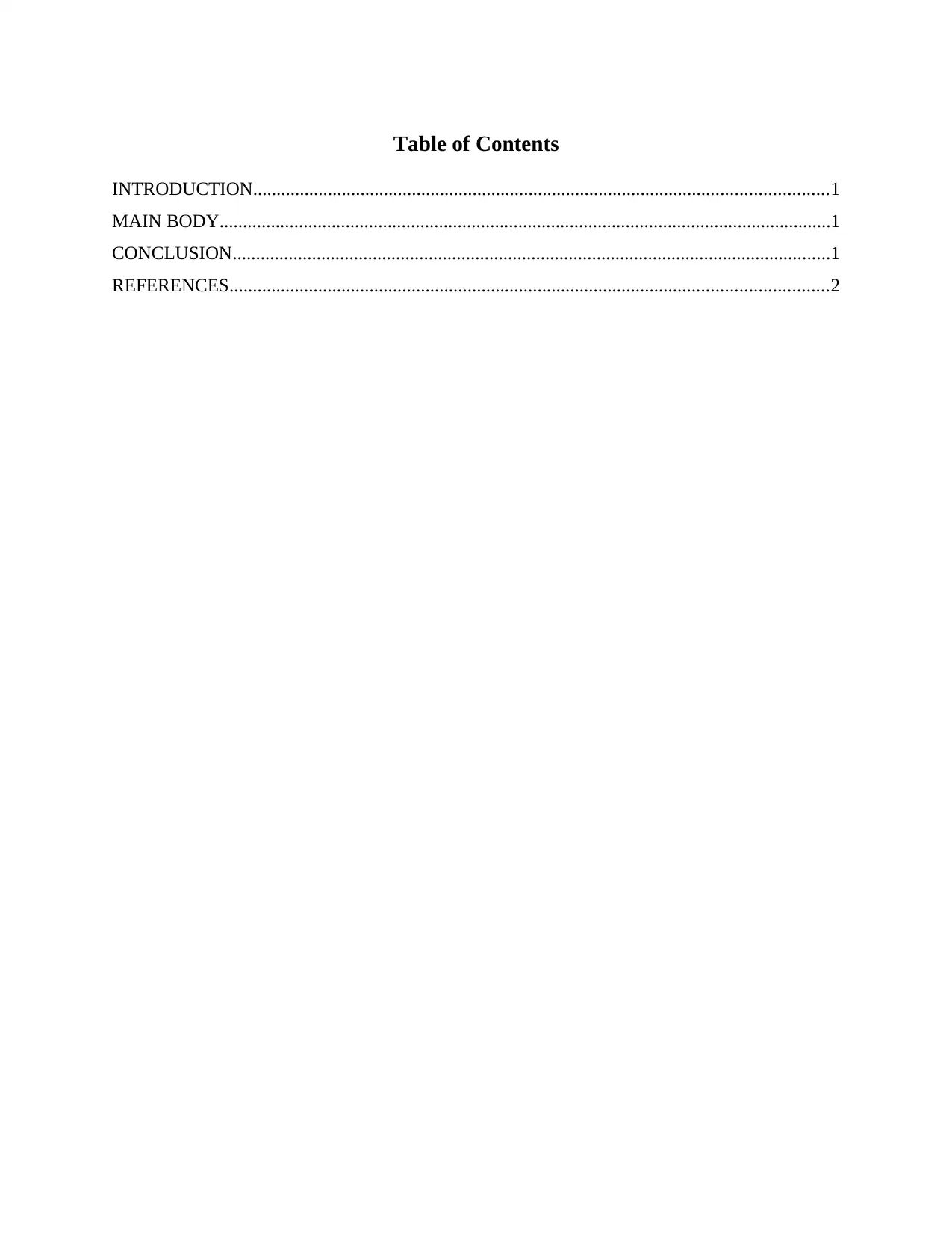
Table of Contents
INTRODUCTION...........................................................................................................................1
MAIN BODY...................................................................................................................................1
CONCLUSION................................................................................................................................1
REFERENCES................................................................................................................................2
INTRODUCTION...........................................................................................................................1
MAIN BODY...................................................................................................................................1
CONCLUSION................................................................................................................................1
REFERENCES................................................................................................................................2
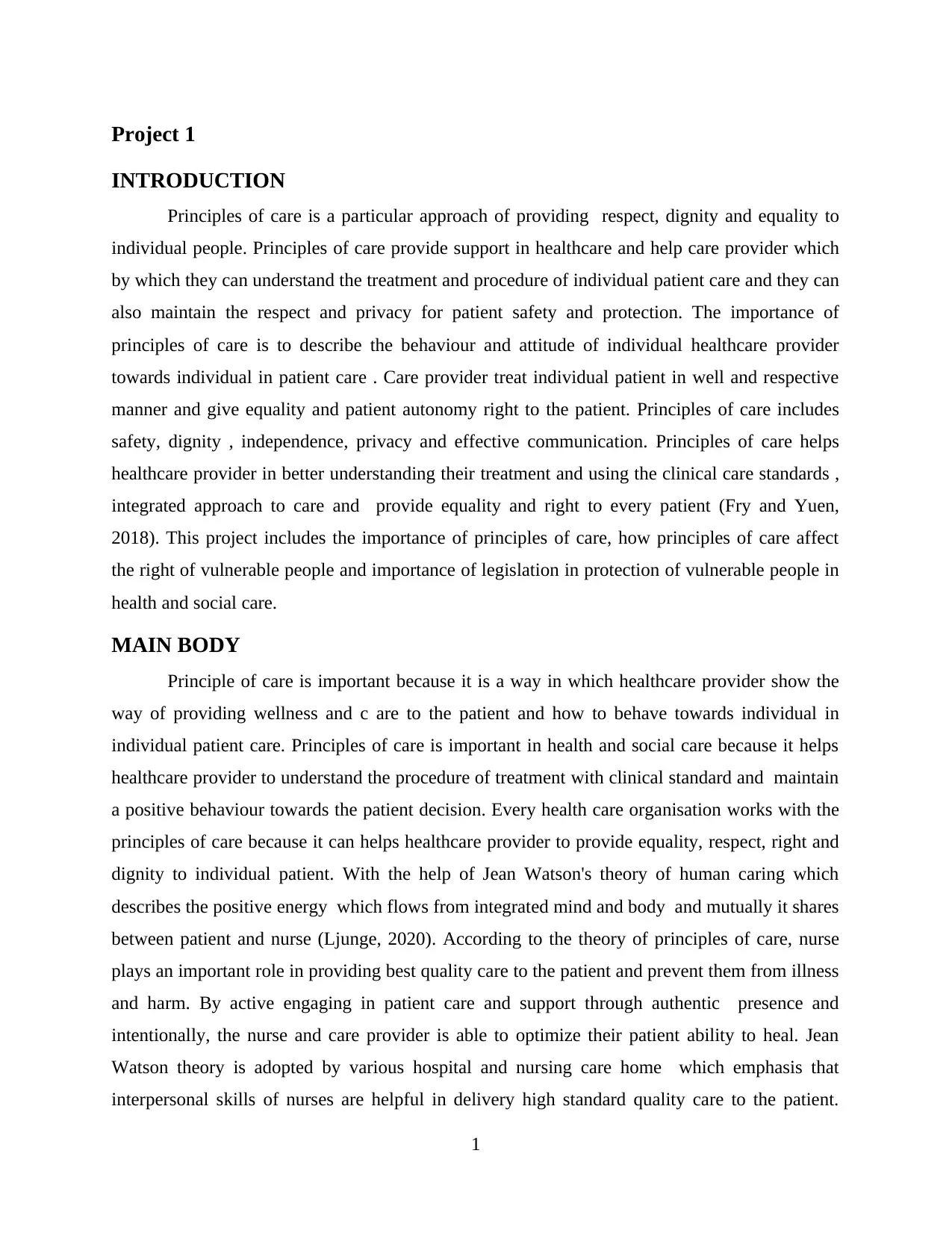
Project 1
INTRODUCTION
Principles of care is a particular approach of providing respect, dignity and equality to
individual people. Principles of care provide support in healthcare and help care provider which
by which they can understand the treatment and procedure of individual patient care and they can
also maintain the respect and privacy for patient safety and protection. The importance of
principles of care is to describe the behaviour and attitude of individual healthcare provider
towards individual in patient care . Care provider treat individual patient in well and respective
manner and give equality and patient autonomy right to the patient. Principles of care includes
safety, dignity , independence, privacy and effective communication. Principles of care helps
healthcare provider in better understanding their treatment and using the clinical care standards ,
integrated approach to care and provide equality and right to every patient (Fry and Yuen,
2018). This project includes the importance of principles of care, how principles of care affect
the right of vulnerable people and importance of legislation in protection of vulnerable people in
health and social care.
MAIN BODY
Principle of care is important because it is a way in which healthcare provider show the
way of providing wellness and c are to the patient and how to behave towards individual in
individual patient care. Principles of care is important in health and social care because it helps
healthcare provider to understand the procedure of treatment with clinical standard and maintain
a positive behaviour towards the patient decision. Every health care organisation works with the
principles of care because it can helps healthcare provider to provide equality, respect, right and
dignity to individual patient. With the help of Jean Watson's theory of human caring which
describes the positive energy which flows from integrated mind and body and mutually it shares
between patient and nurse (Ljunge, 2020). According to the theory of principles of care, nurse
plays an important role in providing best quality care to the patient and prevent them from illness
and harm. By active engaging in patient care and support through authentic presence and
intentionally, the nurse and care provider is able to optimize their patient ability to heal. Jean
Watson theory is adopted by various hospital and nursing care home which emphasis that
interpersonal skills of nurses are helpful in delivery high standard quality care to the patient.
1
INTRODUCTION
Principles of care is a particular approach of providing respect, dignity and equality to
individual people. Principles of care provide support in healthcare and help care provider which
by which they can understand the treatment and procedure of individual patient care and they can
also maintain the respect and privacy for patient safety and protection. The importance of
principles of care is to describe the behaviour and attitude of individual healthcare provider
towards individual in patient care . Care provider treat individual patient in well and respective
manner and give equality and patient autonomy right to the patient. Principles of care includes
safety, dignity , independence, privacy and effective communication. Principles of care helps
healthcare provider in better understanding their treatment and using the clinical care standards ,
integrated approach to care and provide equality and right to every patient (Fry and Yuen,
2018). This project includes the importance of principles of care, how principles of care affect
the right of vulnerable people and importance of legislation in protection of vulnerable people in
health and social care.
MAIN BODY
Principle of care is important because it is a way in which healthcare provider show the
way of providing wellness and c are to the patient and how to behave towards individual in
individual patient care. Principles of care is important in health and social care because it helps
healthcare provider to understand the procedure of treatment with clinical standard and maintain
a positive behaviour towards the patient decision. Every health care organisation works with the
principles of care because it can helps healthcare provider to provide equality, respect, right and
dignity to individual patient. With the help of Jean Watson's theory of human caring which
describes the positive energy which flows from integrated mind and body and mutually it shares
between patient and nurse (Ljunge, 2020). According to the theory of principles of care, nurse
plays an important role in providing best quality care to the patient and prevent them from illness
and harm. By active engaging in patient care and support through authentic presence and
intentionally, the nurse and care provider is able to optimize their patient ability to heal. Jean
Watson theory is adopted by various hospital and nursing care home which emphasis that
interpersonal skills of nurses are helpful in delivery high standard quality care to the patient.
1
⊘ This is a preview!⊘
Do you want full access?
Subscribe today to unlock all pages.

Trusted by 1+ million students worldwide
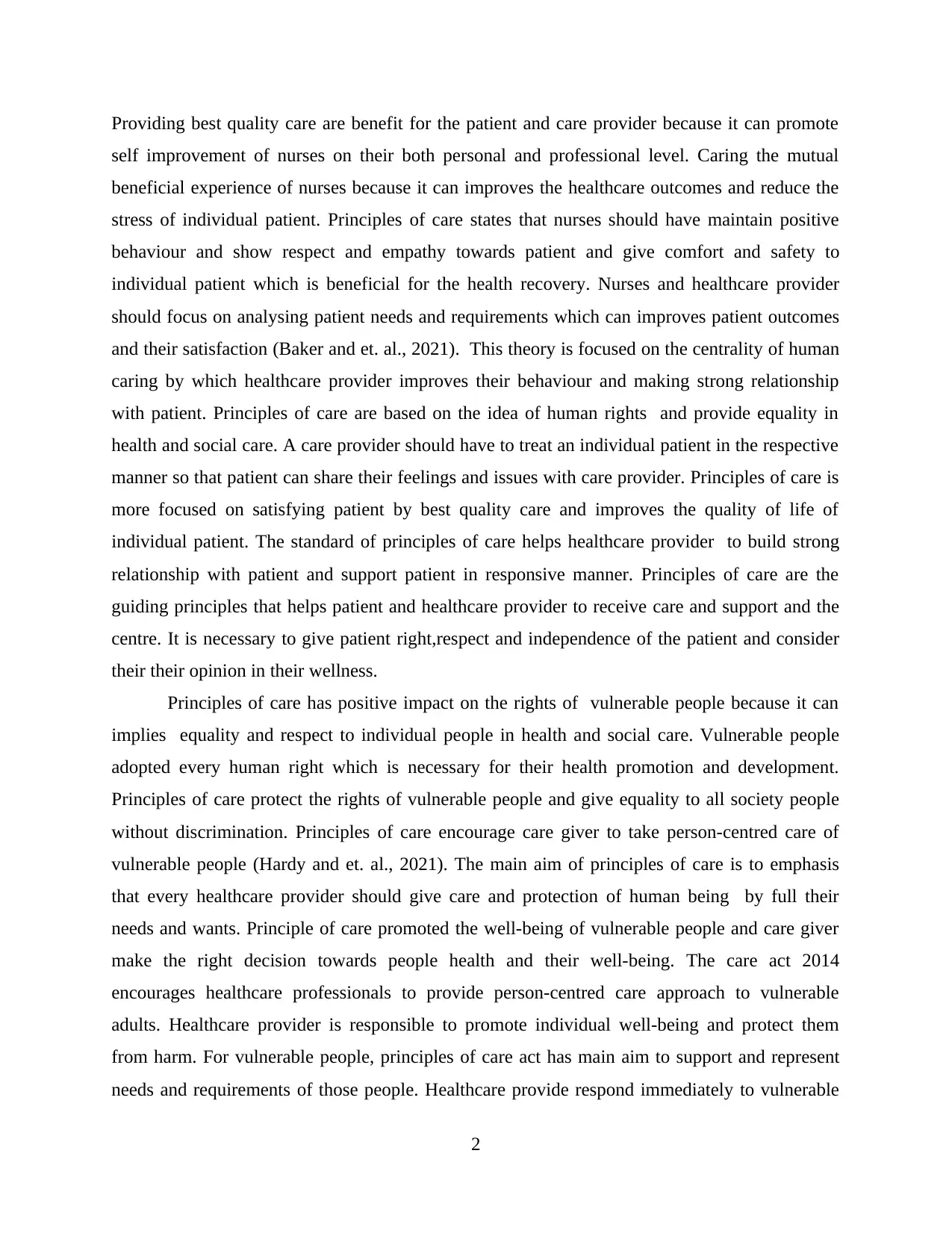
Providing best quality care are benefit for the patient and care provider because it can promote
self improvement of nurses on their both personal and professional level. Caring the mutual
beneficial experience of nurses because it can improves the healthcare outcomes and reduce the
stress of individual patient. Principles of care states that nurses should have maintain positive
behaviour and show respect and empathy towards patient and give comfort and safety to
individual patient which is beneficial for the health recovery. Nurses and healthcare provider
should focus on analysing patient needs and requirements which can improves patient outcomes
and their satisfaction (Baker and et. al., 2021). This theory is focused on the centrality of human
caring by which healthcare provider improves their behaviour and making strong relationship
with patient. Principles of care are based on the idea of human rights and provide equality in
health and social care. A care provider should have to treat an individual patient in the respective
manner so that patient can share their feelings and issues with care provider. Principles of care is
more focused on satisfying patient by best quality care and improves the quality of life of
individual patient. The standard of principles of care helps healthcare provider to build strong
relationship with patient and support patient in responsive manner. Principles of care are the
guiding principles that helps patient and healthcare provider to receive care and support and the
centre. It is necessary to give patient right,respect and independence of the patient and consider
their their opinion in their wellness.
Principles of care has positive impact on the rights of vulnerable people because it can
implies equality and respect to individual people in health and social care. Vulnerable people
adopted every human right which is necessary for their health promotion and development.
Principles of care protect the rights of vulnerable people and give equality to all society people
without discrimination. Principles of care encourage care giver to take person-centred care of
vulnerable people (Hardy and et. al., 2021). The main aim of principles of care is to emphasis
that every healthcare provider should give care and protection of human being by full their
needs and wants. Principle of care promoted the well-being of vulnerable people and care giver
make the right decision towards people health and their well-being. The care act 2014
encourages healthcare professionals to provide person-centred care approach to vulnerable
adults. Healthcare provider is responsible to promote individual well-being and protect them
from harm. For vulnerable people, principles of care act has main aim to support and represent
needs and requirements of those people. Healthcare provide respond immediately to vulnerable
2
self improvement of nurses on their both personal and professional level. Caring the mutual
beneficial experience of nurses because it can improves the healthcare outcomes and reduce the
stress of individual patient. Principles of care states that nurses should have maintain positive
behaviour and show respect and empathy towards patient and give comfort and safety to
individual patient which is beneficial for the health recovery. Nurses and healthcare provider
should focus on analysing patient needs and requirements which can improves patient outcomes
and their satisfaction (Baker and et. al., 2021). This theory is focused on the centrality of human
caring by which healthcare provider improves their behaviour and making strong relationship
with patient. Principles of care are based on the idea of human rights and provide equality in
health and social care. A care provider should have to treat an individual patient in the respective
manner so that patient can share their feelings and issues with care provider. Principles of care is
more focused on satisfying patient by best quality care and improves the quality of life of
individual patient. The standard of principles of care helps healthcare provider to build strong
relationship with patient and support patient in responsive manner. Principles of care are the
guiding principles that helps patient and healthcare provider to receive care and support and the
centre. It is necessary to give patient right,respect and independence of the patient and consider
their their opinion in their wellness.
Principles of care has positive impact on the rights of vulnerable people because it can
implies equality and respect to individual people in health and social care. Vulnerable people
adopted every human right which is necessary for their health promotion and development.
Principles of care protect the rights of vulnerable people and give equality to all society people
without discrimination. Principles of care encourage care giver to take person-centred care of
vulnerable people (Hardy and et. al., 2021). The main aim of principles of care is to emphasis
that every healthcare provider should give care and protection of human being by full their
needs and wants. Principle of care promoted the well-being of vulnerable people and care giver
make the right decision towards people health and their well-being. The care act 2014
encourages healthcare professionals to provide person-centred care approach to vulnerable
adults. Healthcare provider is responsible to promote individual well-being and protect them
from harm. For vulnerable people, principles of care act has main aim to support and represent
needs and requirements of those people. Healthcare provide respond immediately to vulnerable
2
Paraphrase This Document
Need a fresh take? Get an instant paraphrase of this document with our AI Paraphraser
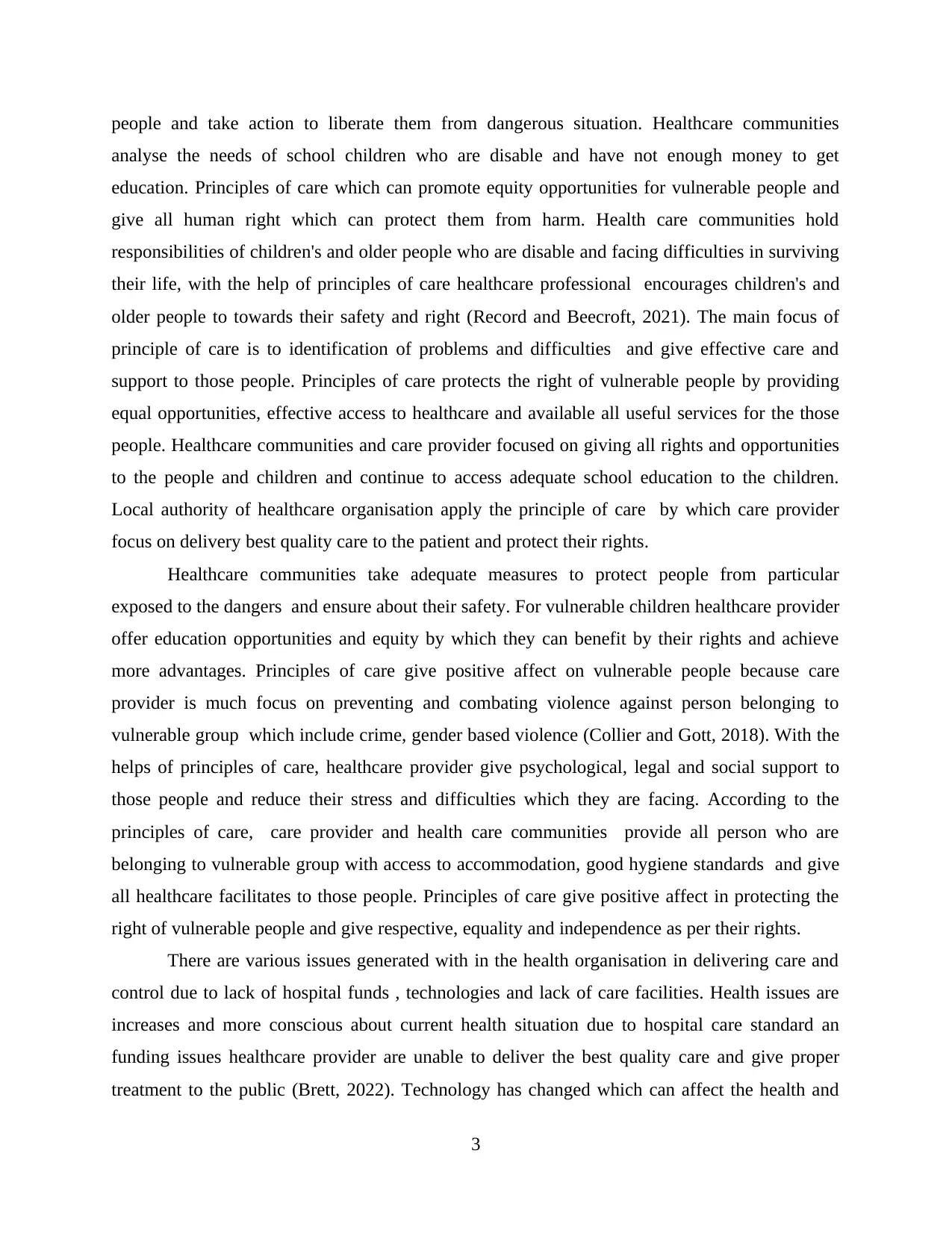
people and take action to liberate them from dangerous situation. Healthcare communities
analyse the needs of school children who are disable and have not enough money to get
education. Principles of care which can promote equity opportunities for vulnerable people and
give all human right which can protect them from harm. Health care communities hold
responsibilities of children's and older people who are disable and facing difficulties in surviving
their life, with the help of principles of care healthcare professional encourages children's and
older people to towards their safety and right (Record and Beecroft, 2021). The main focus of
principle of care is to identification of problems and difficulties and give effective care and
support to those people. Principles of care protects the right of vulnerable people by providing
equal opportunities, effective access to healthcare and available all useful services for the those
people. Healthcare communities and care provider focused on giving all rights and opportunities
to the people and children and continue to access adequate school education to the children.
Local authority of healthcare organisation apply the principle of care by which care provider
focus on delivery best quality care to the patient and protect their rights.
Healthcare communities take adequate measures to protect people from particular
exposed to the dangers and ensure about their safety. For vulnerable children healthcare provider
offer education opportunities and equity by which they can benefit by their rights and achieve
more advantages. Principles of care give positive affect on vulnerable people because care
provider is much focus on preventing and combating violence against person belonging to
vulnerable group which include crime, gender based violence (Collier and Gott, 2018). With the
helps of principles of care, healthcare provider give psychological, legal and social support to
those people and reduce their stress and difficulties which they are facing. According to the
principles of care, care provider and health care communities provide all person who are
belonging to vulnerable group with access to accommodation, good hygiene standards and give
all healthcare facilitates to those people. Principles of care give positive affect in protecting the
right of vulnerable people and give respective, equality and independence as per their rights.
There are various issues generated with in the health organisation in delivering care and
control due to lack of hospital funds , technologies and lack of care facilities. Health issues are
increases and more conscious about current health situation due to hospital care standard an
funding issues healthcare provider are unable to deliver the best quality care and give proper
treatment to the public (Brett, 2022). Technology has changed which can affect the health and
3
analyse the needs of school children who are disable and have not enough money to get
education. Principles of care which can promote equity opportunities for vulnerable people and
give all human right which can protect them from harm. Health care communities hold
responsibilities of children's and older people who are disable and facing difficulties in surviving
their life, with the help of principles of care healthcare professional encourages children's and
older people to towards their safety and right (Record and Beecroft, 2021). The main focus of
principle of care is to identification of problems and difficulties and give effective care and
support to those people. Principles of care protects the right of vulnerable people by providing
equal opportunities, effective access to healthcare and available all useful services for the those
people. Healthcare communities and care provider focused on giving all rights and opportunities
to the people and children and continue to access adequate school education to the children.
Local authority of healthcare organisation apply the principle of care by which care provider
focus on delivery best quality care to the patient and protect their rights.
Healthcare communities take adequate measures to protect people from particular
exposed to the dangers and ensure about their safety. For vulnerable children healthcare provider
offer education opportunities and equity by which they can benefit by their rights and achieve
more advantages. Principles of care give positive affect on vulnerable people because care
provider is much focus on preventing and combating violence against person belonging to
vulnerable group which include crime, gender based violence (Collier and Gott, 2018). With the
helps of principles of care, healthcare provider give psychological, legal and social support to
those people and reduce their stress and difficulties which they are facing. According to the
principles of care, care provider and health care communities provide all person who are
belonging to vulnerable group with access to accommodation, good hygiene standards and give
all healthcare facilitates to those people. Principles of care give positive affect in protecting the
right of vulnerable people and give respective, equality and independence as per their rights.
There are various issues generated with in the health organisation in delivering care and
control due to lack of hospital funds , technologies and lack of care facilities. Health issues are
increases and more conscious about current health situation due to hospital care standard an
funding issues healthcare provider are unable to deliver the best quality care and give proper
treatment to the public (Brett, 2022). Technology has changed which can affect the health and
3
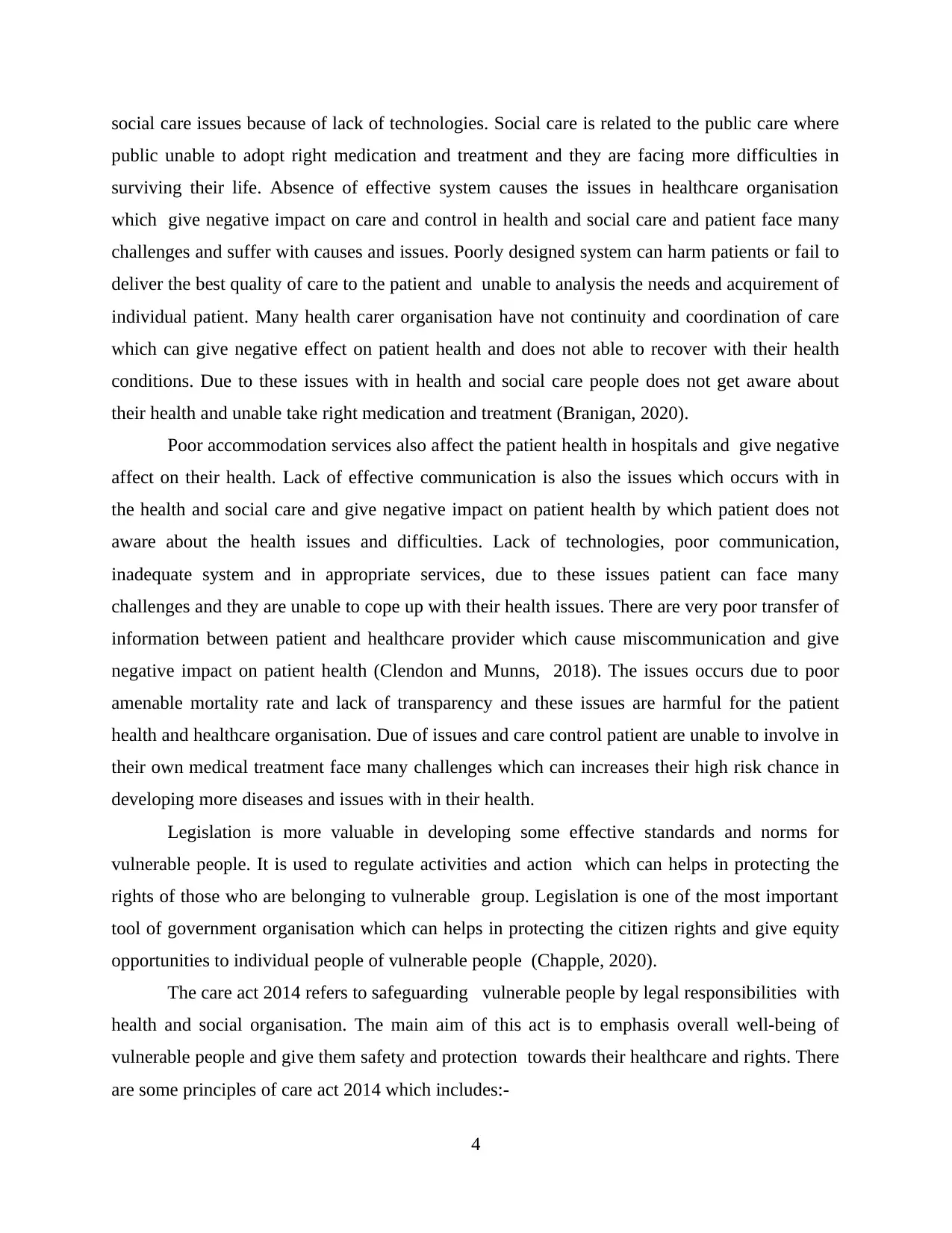
social care issues because of lack of technologies. Social care is related to the public care where
public unable to adopt right medication and treatment and they are facing more difficulties in
surviving their life. Absence of effective system causes the issues in healthcare organisation
which give negative impact on care and control in health and social care and patient face many
challenges and suffer with causes and issues. Poorly designed system can harm patients or fail to
deliver the best quality of care to the patient and unable to analysis the needs and acquirement of
individual patient. Many health carer organisation have not continuity and coordination of care
which can give negative effect on patient health and does not able to recover with their health
conditions. Due to these issues with in health and social care people does not get aware about
their health and unable take right medication and treatment (Branigan, 2020).
Poor accommodation services also affect the patient health in hospitals and give negative
affect on their health. Lack of effective communication is also the issues which occurs with in
the health and social care and give negative impact on patient health by which patient does not
aware about the health issues and difficulties. Lack of technologies, poor communication,
inadequate system and in appropriate services, due to these issues patient can face many
challenges and they are unable to cope up with their health issues. There are very poor transfer of
information between patient and healthcare provider which cause miscommunication and give
negative impact on patient health (Clendon and Munns, 2018). The issues occurs due to poor
amenable mortality rate and lack of transparency and these issues are harmful for the patient
health and healthcare organisation. Due of issues and care control patient are unable to involve in
their own medical treatment face many challenges which can increases their high risk chance in
developing more diseases and issues with in their health.
Legislation is more valuable in developing some effective standards and norms for
vulnerable people. It is used to regulate activities and action which can helps in protecting the
rights of those who are belonging to vulnerable group. Legislation is one of the most important
tool of government organisation which can helps in protecting the citizen rights and give equity
opportunities to individual people of vulnerable people (Chapple, 2020).
The care act 2014 refers to safeguarding vulnerable people by legal responsibilities with
health and social organisation. The main aim of this act is to emphasis overall well-being of
vulnerable people and give them safety and protection towards their healthcare and rights. There
are some principles of care act 2014 which includes:-
4
public unable to adopt right medication and treatment and they are facing more difficulties in
surviving their life. Absence of effective system causes the issues in healthcare organisation
which give negative impact on care and control in health and social care and patient face many
challenges and suffer with causes and issues. Poorly designed system can harm patients or fail to
deliver the best quality of care to the patient and unable to analysis the needs and acquirement of
individual patient. Many health carer organisation have not continuity and coordination of care
which can give negative effect on patient health and does not able to recover with their health
conditions. Due to these issues with in health and social care people does not get aware about
their health and unable take right medication and treatment (Branigan, 2020).
Poor accommodation services also affect the patient health in hospitals and give negative
affect on their health. Lack of effective communication is also the issues which occurs with in
the health and social care and give negative impact on patient health by which patient does not
aware about the health issues and difficulties. Lack of technologies, poor communication,
inadequate system and in appropriate services, due to these issues patient can face many
challenges and they are unable to cope up with their health issues. There are very poor transfer of
information between patient and healthcare provider which cause miscommunication and give
negative impact on patient health (Clendon and Munns, 2018). The issues occurs due to poor
amenable mortality rate and lack of transparency and these issues are harmful for the patient
health and healthcare organisation. Due of issues and care control patient are unable to involve in
their own medical treatment face many challenges which can increases their high risk chance in
developing more diseases and issues with in their health.
Legislation is more valuable in developing some effective standards and norms for
vulnerable people. It is used to regulate activities and action which can helps in protecting the
rights of those who are belonging to vulnerable group. Legislation is one of the most important
tool of government organisation which can helps in protecting the citizen rights and give equity
opportunities to individual people of vulnerable people (Chapple, 2020).
The care act 2014 refers to safeguarding vulnerable people by legal responsibilities with
health and social organisation. The main aim of this act is to emphasis overall well-being of
vulnerable people and give them safety and protection towards their healthcare and rights. There
are some principles of care act 2014 which includes:-
4
⊘ This is a preview!⊘
Do you want full access?
Subscribe today to unlock all pages.

Trusted by 1+ million students worldwide
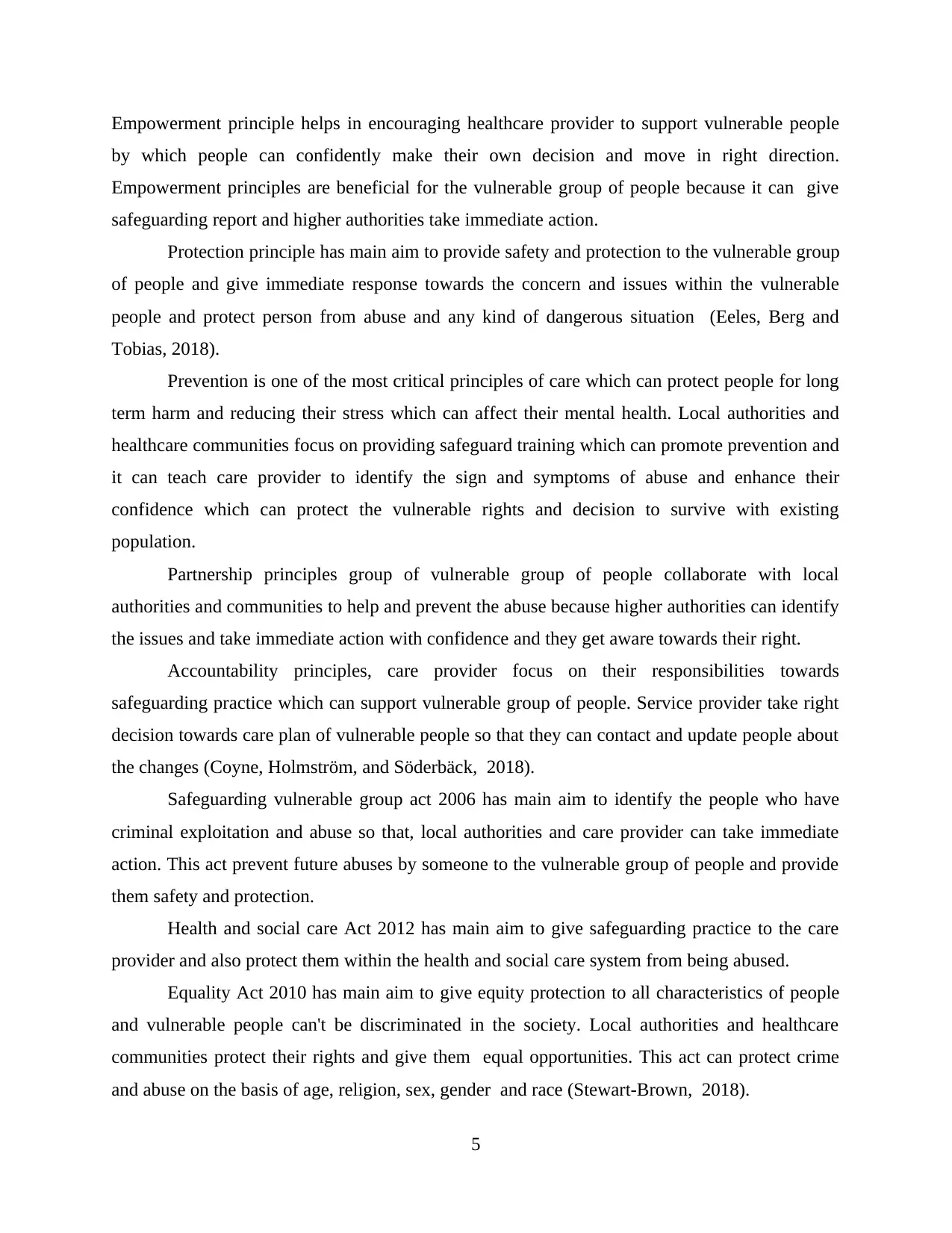
Empowerment principle helps in encouraging healthcare provider to support vulnerable people
by which people can confidently make their own decision and move in right direction.
Empowerment principles are beneficial for the vulnerable group of people because it can give
safeguarding report and higher authorities take immediate action.
Protection principle has main aim to provide safety and protection to the vulnerable group
of people and give immediate response towards the concern and issues within the vulnerable
people and protect person from abuse and any kind of dangerous situation (Eeles, Berg and
Tobias, 2018).
Prevention is one of the most critical principles of care which can protect people for long
term harm and reducing their stress which can affect their mental health. Local authorities and
healthcare communities focus on providing safeguard training which can promote prevention and
it can teach care provider to identify the sign and symptoms of abuse and enhance their
confidence which can protect the vulnerable rights and decision to survive with existing
population.
Partnership principles group of vulnerable group of people collaborate with local
authorities and communities to help and prevent the abuse because higher authorities can identify
the issues and take immediate action with confidence and they get aware towards their right.
Accountability principles, care provider focus on their responsibilities towards
safeguarding practice which can support vulnerable group of people. Service provider take right
decision towards care plan of vulnerable people so that they can contact and update people about
the changes (Coyne, Holmström, and Söderbäck, 2018).
Safeguarding vulnerable group act 2006 has main aim to identify the people who have
criminal exploitation and abuse so that, local authorities and care provider can take immediate
action. This act prevent future abuses by someone to the vulnerable group of people and provide
them safety and protection.
Health and social care Act 2012 has main aim to give safeguarding practice to the care
provider and also protect them within the health and social care system from being abused.
Equality Act 2010 has main aim to give equity protection to all characteristics of people
and vulnerable people can't be discriminated in the society. Local authorities and healthcare
communities protect their rights and give them equal opportunities. This act can protect crime
and abuse on the basis of age, religion, sex, gender and race (Stewart-Brown, 2018).
5
by which people can confidently make their own decision and move in right direction.
Empowerment principles are beneficial for the vulnerable group of people because it can give
safeguarding report and higher authorities take immediate action.
Protection principle has main aim to provide safety and protection to the vulnerable group
of people and give immediate response towards the concern and issues within the vulnerable
people and protect person from abuse and any kind of dangerous situation (Eeles, Berg and
Tobias, 2018).
Prevention is one of the most critical principles of care which can protect people for long
term harm and reducing their stress which can affect their mental health. Local authorities and
healthcare communities focus on providing safeguard training which can promote prevention and
it can teach care provider to identify the sign and symptoms of abuse and enhance their
confidence which can protect the vulnerable rights and decision to survive with existing
population.
Partnership principles group of vulnerable group of people collaborate with local
authorities and communities to help and prevent the abuse because higher authorities can identify
the issues and take immediate action with confidence and they get aware towards their right.
Accountability principles, care provider focus on their responsibilities towards
safeguarding practice which can support vulnerable group of people. Service provider take right
decision towards care plan of vulnerable people so that they can contact and update people about
the changes (Coyne, Holmström, and Söderbäck, 2018).
Safeguarding vulnerable group act 2006 has main aim to identify the people who have
criminal exploitation and abuse so that, local authorities and care provider can take immediate
action. This act prevent future abuses by someone to the vulnerable group of people and provide
them safety and protection.
Health and social care Act 2012 has main aim to give safeguarding practice to the care
provider and also protect them within the health and social care system from being abused.
Equality Act 2010 has main aim to give equity protection to all characteristics of people
and vulnerable people can't be discriminated in the society. Local authorities and healthcare
communities protect their rights and give them equal opportunities. This act can protect crime
and abuse on the basis of age, religion, sex, gender and race (Stewart-Brown, 2018).
5
Paraphrase This Document
Need a fresh take? Get an instant paraphrase of this document with our AI Paraphraser
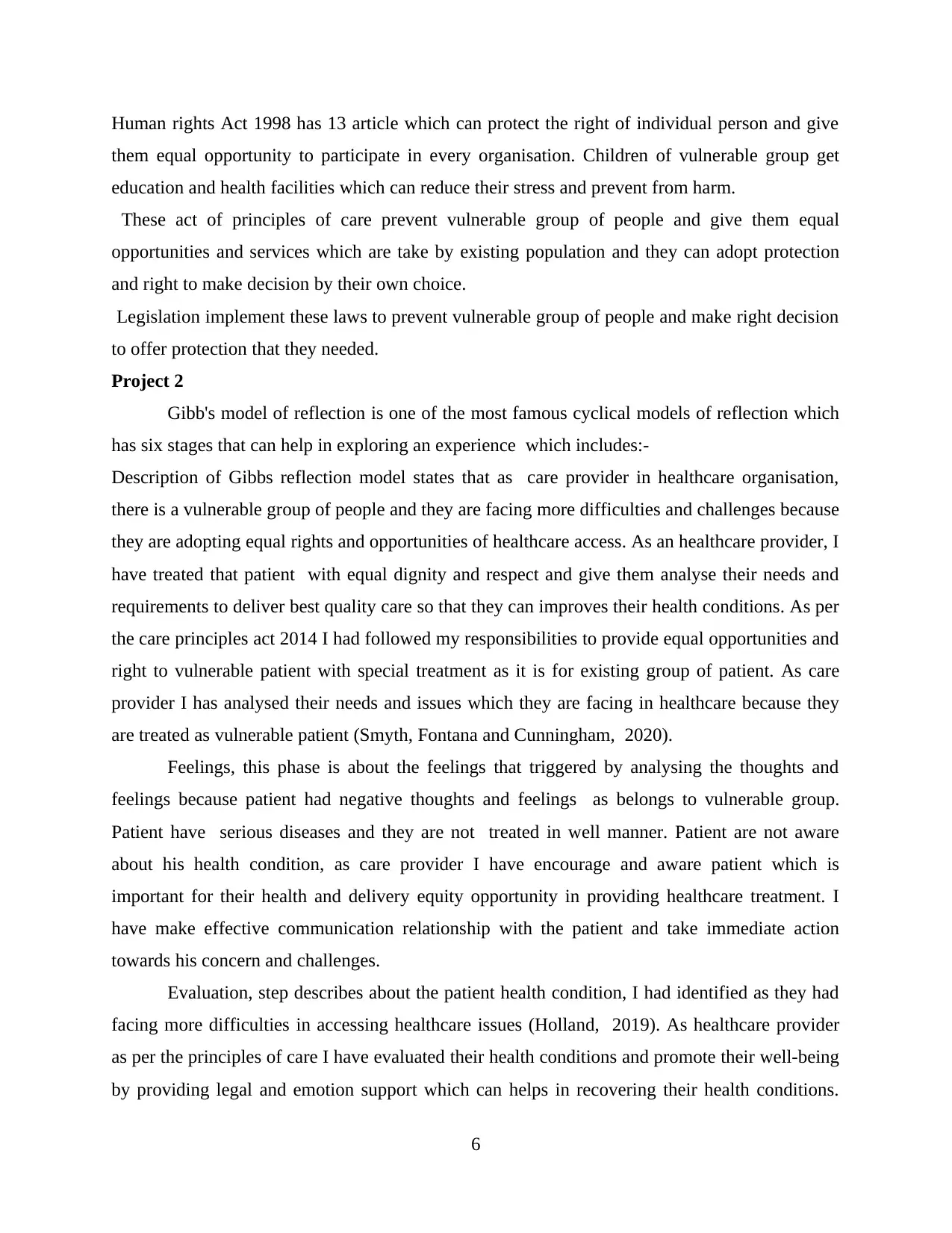
Human rights Act 1998 has 13 article which can protect the right of individual person and give
them equal opportunity to participate in every organisation. Children of vulnerable group get
education and health facilities which can reduce their stress and prevent from harm.
These act of principles of care prevent vulnerable group of people and give them equal
opportunities and services which are take by existing population and they can adopt protection
and right to make decision by their own choice.
Legislation implement these laws to prevent vulnerable group of people and make right decision
to offer protection that they needed.
Project 2
Gibb's model of reflection is one of the most famous cyclical models of reflection which
has six stages that can help in exploring an experience which includes:-
Description of Gibbs reflection model states that as care provider in healthcare organisation,
there is a vulnerable group of people and they are facing more difficulties and challenges because
they are adopting equal rights and opportunities of healthcare access. As an healthcare provider, I
have treated that patient with equal dignity and respect and give them analyse their needs and
requirements to deliver best quality care so that they can improves their health conditions. As per
the care principles act 2014 I had followed my responsibilities to provide equal opportunities and
right to vulnerable patient with special treatment as it is for existing group of patient. As care
provider I has analysed their needs and issues which they are facing in healthcare because they
are treated as vulnerable patient (Smyth, Fontana and Cunningham, 2020).
Feelings, this phase is about the feelings that triggered by analysing the thoughts and
feelings because patient had negative thoughts and feelings as belongs to vulnerable group.
Patient have serious diseases and they are not treated in well manner. Patient are not aware
about his health condition, as care provider I have encourage and aware patient which is
important for their health and delivery equity opportunity in providing healthcare treatment. I
have make effective communication relationship with the patient and take immediate action
towards his concern and challenges.
Evaluation, step describes about the patient health condition, I had identified as they had
facing more difficulties in accessing healthcare issues (Holland, 2019). As healthcare provider
as per the principles of care I have evaluated their health conditions and promote their well-being
by providing legal and emotion support which can helps in recovering their health conditions.
6
them equal opportunity to participate in every organisation. Children of vulnerable group get
education and health facilities which can reduce their stress and prevent from harm.
These act of principles of care prevent vulnerable group of people and give them equal
opportunities and services which are take by existing population and they can adopt protection
and right to make decision by their own choice.
Legislation implement these laws to prevent vulnerable group of people and make right decision
to offer protection that they needed.
Project 2
Gibb's model of reflection is one of the most famous cyclical models of reflection which
has six stages that can help in exploring an experience which includes:-
Description of Gibbs reflection model states that as care provider in healthcare organisation,
there is a vulnerable group of people and they are facing more difficulties and challenges because
they are adopting equal rights and opportunities of healthcare access. As an healthcare provider, I
have treated that patient with equal dignity and respect and give them analyse their needs and
requirements to deliver best quality care so that they can improves their health conditions. As per
the care principles act 2014 I had followed my responsibilities to provide equal opportunities and
right to vulnerable patient with special treatment as it is for existing group of patient. As care
provider I has analysed their needs and issues which they are facing in healthcare because they
are treated as vulnerable patient (Smyth, Fontana and Cunningham, 2020).
Feelings, this phase is about the feelings that triggered by analysing the thoughts and
feelings because patient had negative thoughts and feelings as belongs to vulnerable group.
Patient have serious diseases and they are not treated in well manner. Patient are not aware
about his health condition, as care provider I have encourage and aware patient which is
important for their health and delivery equity opportunity in providing healthcare treatment. I
have make effective communication relationship with the patient and take immediate action
towards his concern and challenges.
Evaluation, step describes about the patient health condition, I had identified as they had
facing more difficulties in accessing healthcare issues (Holland, 2019). As healthcare provider
as per the principles of care I have evaluated their health conditions and promote their well-being
by providing legal and emotion support which can helps in recovering their health conditions.
6
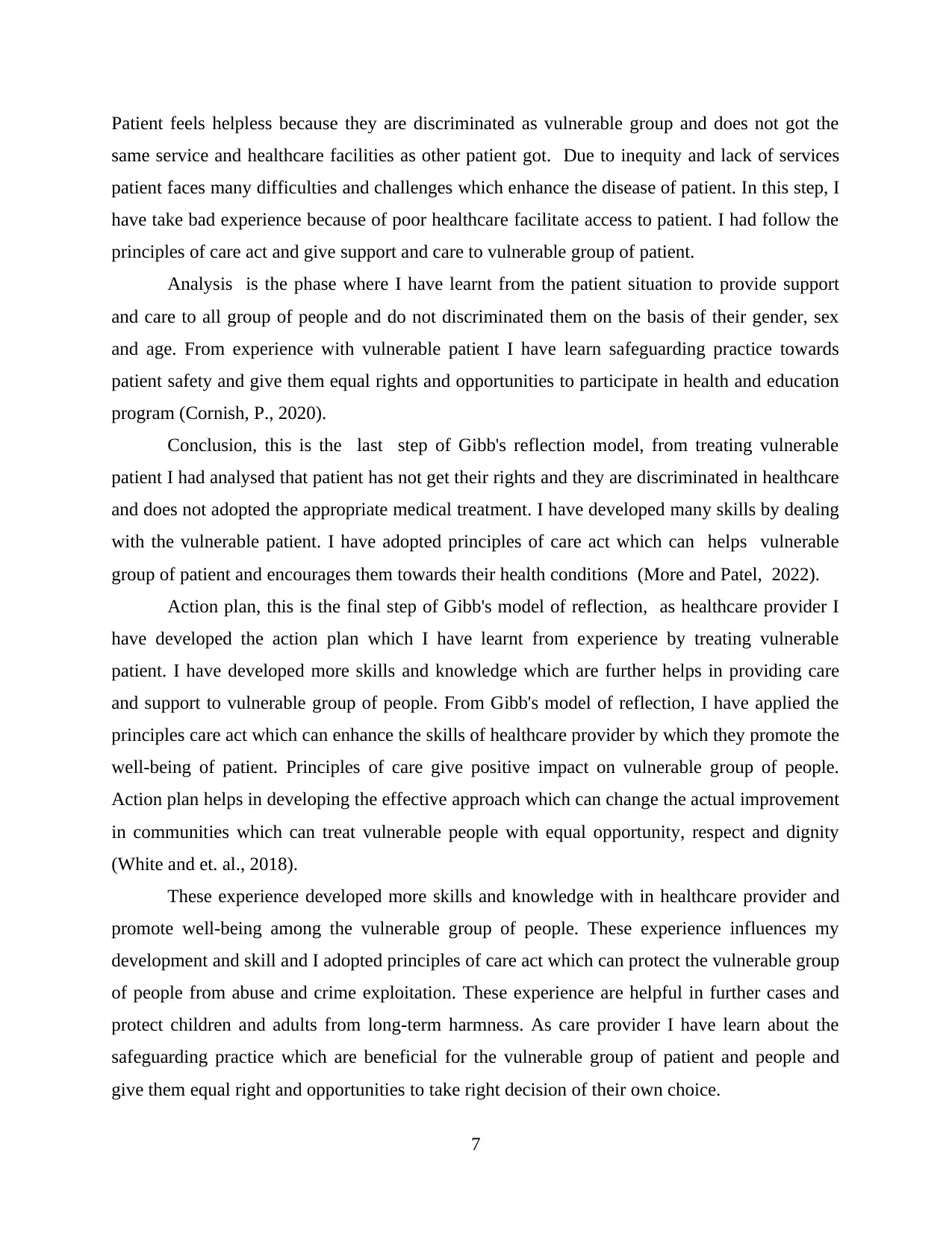
Patient feels helpless because they are discriminated as vulnerable group and does not got the
same service and healthcare facilities as other patient got. Due to inequity and lack of services
patient faces many difficulties and challenges which enhance the disease of patient. In this step, I
have take bad experience because of poor healthcare facilitate access to patient. I had follow the
principles of care act and give support and care to vulnerable group of patient.
Analysis is the phase where I have learnt from the patient situation to provide support
and care to all group of people and do not discriminated them on the basis of their gender, sex
and age. From experience with vulnerable patient I have learn safeguarding practice towards
patient safety and give them equal rights and opportunities to participate in health and education
program (Cornish, P., 2020).
Conclusion, this is the last step of Gibb's reflection model, from treating vulnerable
patient I had analysed that patient has not get their rights and they are discriminated in healthcare
and does not adopted the appropriate medical treatment. I have developed many skills by dealing
with the vulnerable patient. I have adopted principles of care act which can helps vulnerable
group of patient and encourages them towards their health conditions (More and Patel, 2022).
Action plan, this is the final step of Gibb's model of reflection, as healthcare provider I
have developed the action plan which I have learnt from experience by treating vulnerable
patient. I have developed more skills and knowledge which are further helps in providing care
and support to vulnerable group of people. From Gibb's model of reflection, I have applied the
principles care act which can enhance the skills of healthcare provider by which they promote the
well-being of patient. Principles of care give positive impact on vulnerable group of people.
Action plan helps in developing the effective approach which can change the actual improvement
in communities which can treat vulnerable people with equal opportunity, respect and dignity
(White and et. al., 2018).
These experience developed more skills and knowledge with in healthcare provider and
promote well-being among the vulnerable group of people. These experience influences my
development and skill and I adopted principles of care act which can protect the vulnerable group
of people from abuse and crime exploitation. These experience are helpful in further cases and
protect children and adults from long-term harmness. As care provider I have learn about the
safeguarding practice which are beneficial for the vulnerable group of patient and people and
give them equal right and opportunities to take right decision of their own choice.
7
same service and healthcare facilities as other patient got. Due to inequity and lack of services
patient faces many difficulties and challenges which enhance the disease of patient. In this step, I
have take bad experience because of poor healthcare facilitate access to patient. I had follow the
principles of care act and give support and care to vulnerable group of patient.
Analysis is the phase where I have learnt from the patient situation to provide support
and care to all group of people and do not discriminated them on the basis of their gender, sex
and age. From experience with vulnerable patient I have learn safeguarding practice towards
patient safety and give them equal rights and opportunities to participate in health and education
program (Cornish, P., 2020).
Conclusion, this is the last step of Gibb's reflection model, from treating vulnerable
patient I had analysed that patient has not get their rights and they are discriminated in healthcare
and does not adopted the appropriate medical treatment. I have developed many skills by dealing
with the vulnerable patient. I have adopted principles of care act which can helps vulnerable
group of patient and encourages them towards their health conditions (More and Patel, 2022).
Action plan, this is the final step of Gibb's model of reflection, as healthcare provider I
have developed the action plan which I have learnt from experience by treating vulnerable
patient. I have developed more skills and knowledge which are further helps in providing care
and support to vulnerable group of people. From Gibb's model of reflection, I have applied the
principles care act which can enhance the skills of healthcare provider by which they promote the
well-being of patient. Principles of care give positive impact on vulnerable group of people.
Action plan helps in developing the effective approach which can change the actual improvement
in communities which can treat vulnerable people with equal opportunity, respect and dignity
(White and et. al., 2018).
These experience developed more skills and knowledge with in healthcare provider and
promote well-being among the vulnerable group of people. These experience influences my
development and skill and I adopted principles of care act which can protect the vulnerable group
of people from abuse and crime exploitation. These experience are helpful in further cases and
protect children and adults from long-term harmness. As care provider I have learn about the
safeguarding practice which are beneficial for the vulnerable group of patient and people and
give them equal right and opportunities to take right decision of their own choice.
7
⊘ This is a preview!⊘
Do you want full access?
Subscribe today to unlock all pages.

Trusted by 1+ million students worldwide
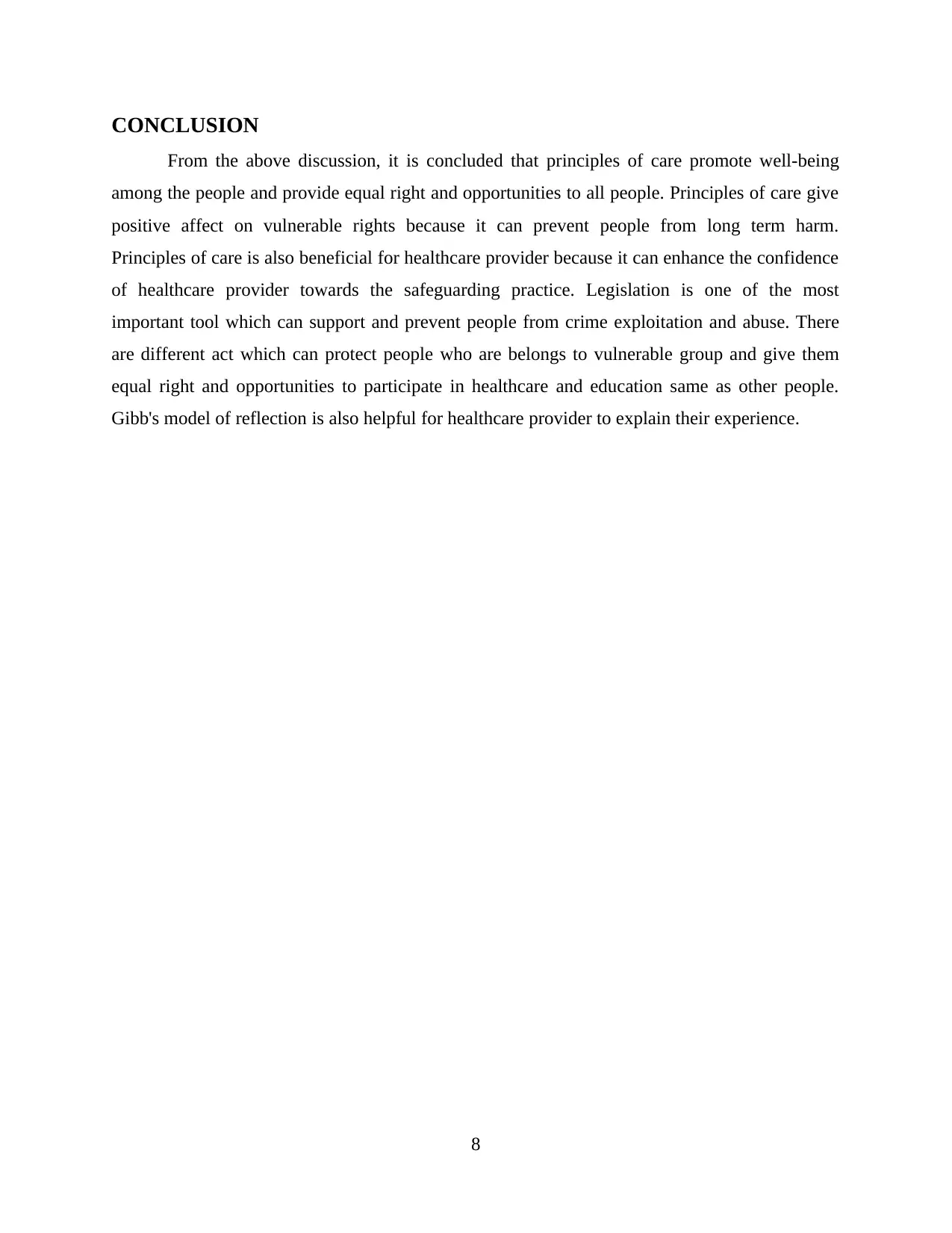
CONCLUSION
From the above discussion, it is concluded that principles of care promote well-being
among the people and provide equal right and opportunities to all people. Principles of care give
positive affect on vulnerable rights because it can prevent people from long term harm.
Principles of care is also beneficial for healthcare provider because it can enhance the confidence
of healthcare provider towards the safeguarding practice. Legislation is one of the most
important tool which can support and prevent people from crime exploitation and abuse. There
are different act which can protect people who are belongs to vulnerable group and give them
equal right and opportunities to participate in healthcare and education same as other people.
Gibb's model of reflection is also helpful for healthcare provider to explain their experience.
8
From the above discussion, it is concluded that principles of care promote well-being
among the people and provide equal right and opportunities to all people. Principles of care give
positive affect on vulnerable rights because it can prevent people from long term harm.
Principles of care is also beneficial for healthcare provider because it can enhance the confidence
of healthcare provider towards the safeguarding practice. Legislation is one of the most
important tool which can support and prevent people from crime exploitation and abuse. There
are different act which can protect people who are belongs to vulnerable group and give them
equal right and opportunities to participate in healthcare and education same as other people.
Gibb's model of reflection is also helpful for healthcare provider to explain their experience.
8
Paraphrase This Document
Need a fresh take? Get an instant paraphrase of this document with our AI Paraphraser
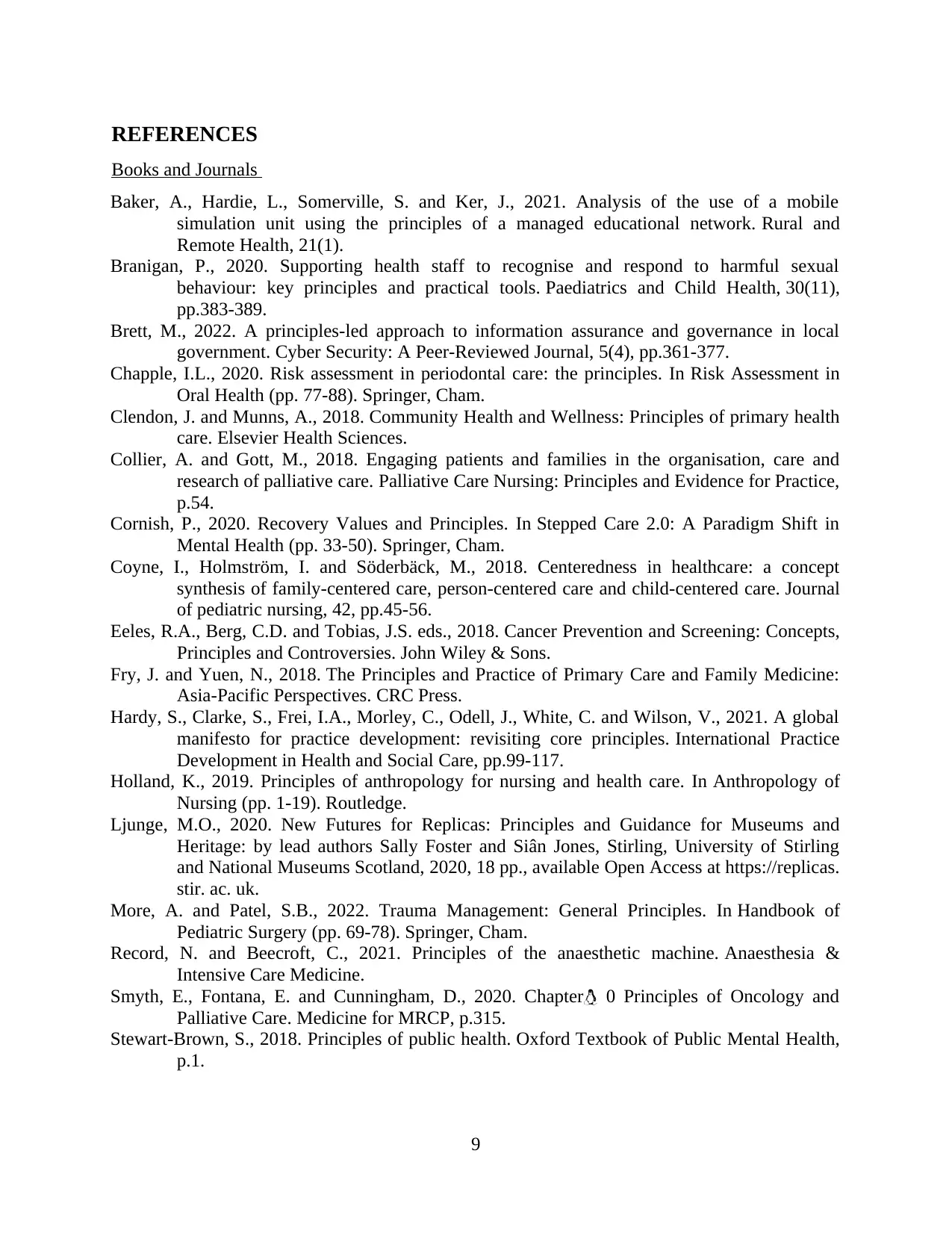
REFERENCES
Books and Journals
Baker, A., Hardie, L., Somerville, S. and Ker, J., 2021. Analysis of the use of a mobile
simulation unit using the principles of a managed educational network. Rural and
Remote Health, 21(1).
Branigan, P., 2020. Supporting health staff to recognise and respond to harmful sexual
behaviour: key principles and practical tools. Paediatrics and Child Health, 30(11),
pp.383-389.
Brett, M., 2022. A principles-led approach to information assurance and governance in local
government. Cyber Security: A Peer-Reviewed Journal, 5(4), pp.361-377.
Chapple, I.L., 2020. Risk assessment in periodontal care: the principles. In Risk Assessment in
Oral Health (pp. 77-88). Springer, Cham.
Clendon, J. and Munns, A., 2018. Community Health and Wellness: Principles of primary health
care. Elsevier Health Sciences.
Collier, A. and Gott, M., 2018. Engaging patients and families in the organisation, care and
research of palliative care. Palliative Care Nursing: Principles and Evidence for Practice,
p.54.
Cornish, P., 2020. Recovery Values and Principles. In Stepped Care 2.0: A Paradigm Shift in
Mental Health (pp. 33-50). Springer, Cham.
Coyne, I., Holmström, I. and Söderbäck, M., 2018. Centeredness in healthcare: a concept
synthesis of family-centered care, person-centered care and child-centered care. Journal
of pediatric nursing, 42, pp.45-56.
Eeles, R.A., Berg, C.D. and Tobias, J.S. eds., 2018. Cancer Prevention and Screening: Concepts,
Principles and Controversies. John Wiley & Sons.
Fry, J. and Yuen, N., 2018. The Principles and Practice of Primary Care and Family Medicine:
Asia-Pacific Perspectives. CRC Press.
Hardy, S., Clarke, S., Frei, I.A., Morley, C., Odell, J., White, C. and Wilson, V., 2021. A global
manifesto for practice development: revisiting core principles. International Practice
Development in Health and Social Care, pp.99-117.
Holland, K., 2019. Principles of anthropology for nursing and health care. In Anthropology of
Nursing (pp. 1-19). Routledge.
Ljunge, M.O., 2020. New Futures for Replicas: Principles and Guidance for Museums and
Heritage: by lead authors Sally Foster and Siân Jones, Stirling, University of Stirling
and National Museums Scotland, 2020, 18 pp., available Open Access at https://replicas.
stir. ac. uk.
More, A. and Patel, S.B., 2022. Trauma Management: General Principles. In Handbook of
Pediatric Surgery (pp. 69-78). Springer, Cham.
Record, N. and Beecroft, C., 2021. Principles of the anaesthetic machine. Anaesthesia &
Intensive Care Medicine.
Smyth, E., Fontana, E. and Cunningham, D., 2020. Chapter 0 Principles of Oncology and
Palliative Care. Medicine for MRCP, p.315.
Stewart-Brown, S., 2018. Principles of public health. Oxford Textbook of Public Mental Health,
p.1.
9
Books and Journals
Baker, A., Hardie, L., Somerville, S. and Ker, J., 2021. Analysis of the use of a mobile
simulation unit using the principles of a managed educational network. Rural and
Remote Health, 21(1).
Branigan, P., 2020. Supporting health staff to recognise and respond to harmful sexual
behaviour: key principles and practical tools. Paediatrics and Child Health, 30(11),
pp.383-389.
Brett, M., 2022. A principles-led approach to information assurance and governance in local
government. Cyber Security: A Peer-Reviewed Journal, 5(4), pp.361-377.
Chapple, I.L., 2020. Risk assessment in periodontal care: the principles. In Risk Assessment in
Oral Health (pp. 77-88). Springer, Cham.
Clendon, J. and Munns, A., 2018. Community Health and Wellness: Principles of primary health
care. Elsevier Health Sciences.
Collier, A. and Gott, M., 2018. Engaging patients and families in the organisation, care and
research of palliative care. Palliative Care Nursing: Principles and Evidence for Practice,
p.54.
Cornish, P., 2020. Recovery Values and Principles. In Stepped Care 2.0: A Paradigm Shift in
Mental Health (pp. 33-50). Springer, Cham.
Coyne, I., Holmström, I. and Söderbäck, M., 2018. Centeredness in healthcare: a concept
synthesis of family-centered care, person-centered care and child-centered care. Journal
of pediatric nursing, 42, pp.45-56.
Eeles, R.A., Berg, C.D. and Tobias, J.S. eds., 2018. Cancer Prevention and Screening: Concepts,
Principles and Controversies. John Wiley & Sons.
Fry, J. and Yuen, N., 2018. The Principles and Practice of Primary Care and Family Medicine:
Asia-Pacific Perspectives. CRC Press.
Hardy, S., Clarke, S., Frei, I.A., Morley, C., Odell, J., White, C. and Wilson, V., 2021. A global
manifesto for practice development: revisiting core principles. International Practice
Development in Health and Social Care, pp.99-117.
Holland, K., 2019. Principles of anthropology for nursing and health care. In Anthropology of
Nursing (pp. 1-19). Routledge.
Ljunge, M.O., 2020. New Futures for Replicas: Principles and Guidance for Museums and
Heritage: by lead authors Sally Foster and Siân Jones, Stirling, University of Stirling
and National Museums Scotland, 2020, 18 pp., available Open Access at https://replicas.
stir. ac. uk.
More, A. and Patel, S.B., 2022. Trauma Management: General Principles. In Handbook of
Pediatric Surgery (pp. 69-78). Springer, Cham.
Record, N. and Beecroft, C., 2021. Principles of the anaesthetic machine. Anaesthesia &
Intensive Care Medicine.
Smyth, E., Fontana, E. and Cunningham, D., 2020. Chapter 0 Principles of Oncology and
Palliative Care. Medicine for MRCP, p.315.
Stewart-Brown, S., 2018. Principles of public health. Oxford Textbook of Public Mental Health,
p.1.
9
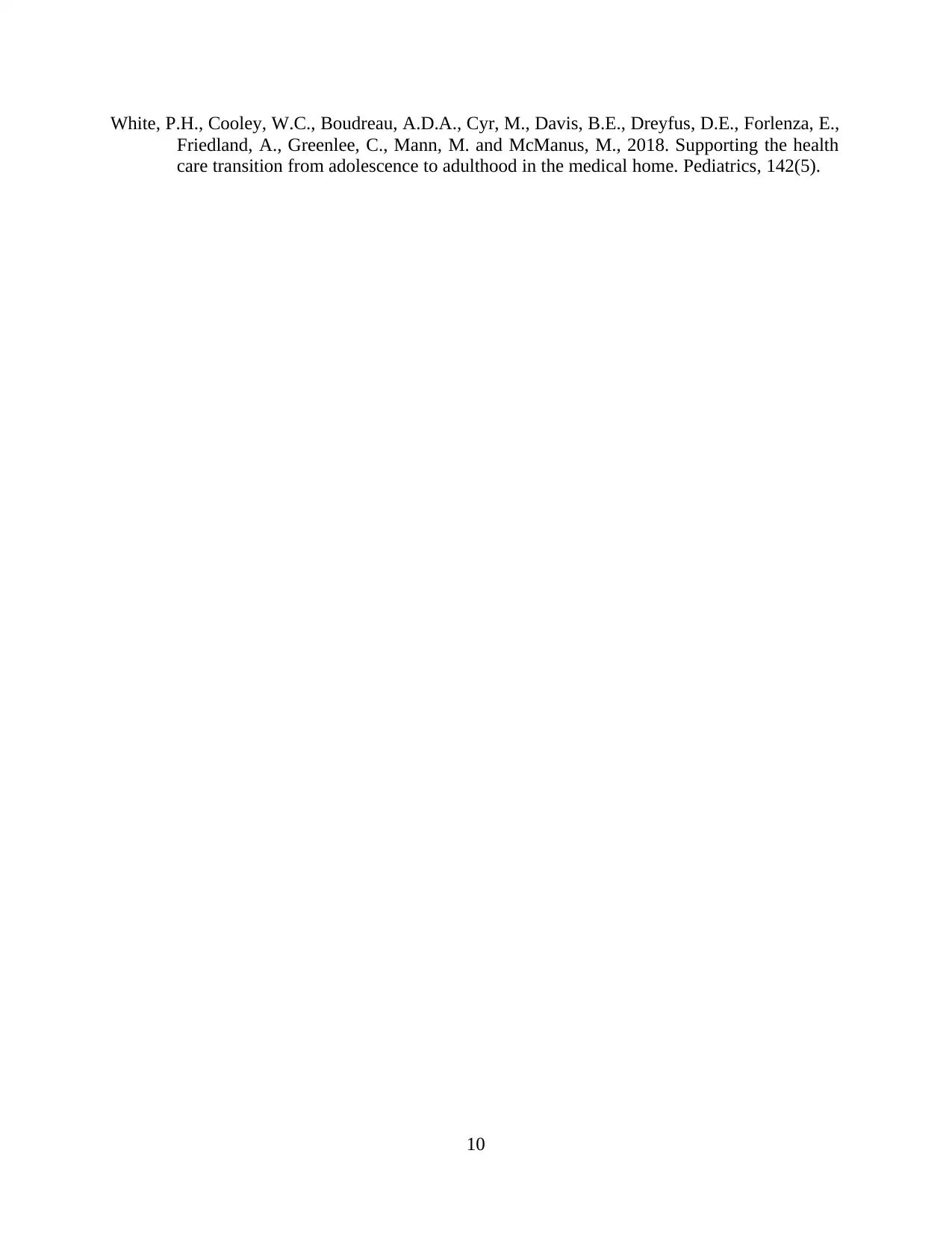
White, P.H., Cooley, W.C., Boudreau, A.D.A., Cyr, M., Davis, B.E., Dreyfus, D.E., Forlenza, E.,
Friedland, A., Greenlee, C., Mann, M. and McManus, M., 2018. Supporting the health
care transition from adolescence to adulthood in the medical home. Pediatrics, 142(5).
10
Friedland, A., Greenlee, C., Mann, M. and McManus, M., 2018. Supporting the health
care transition from adolescence to adulthood in the medical home. Pediatrics, 142(5).
10
⊘ This is a preview!⊘
Do you want full access?
Subscribe today to unlock all pages.

Trusted by 1+ million students worldwide
1 out of 12
Related Documents
Your All-in-One AI-Powered Toolkit for Academic Success.
+13062052269
info@desklib.com
Available 24*7 on WhatsApp / Email
![[object Object]](/_next/static/media/star-bottom.7253800d.svg)
Unlock your academic potential
Copyright © 2020–2026 A2Z Services. All Rights Reserved. Developed and managed by ZUCOL.



